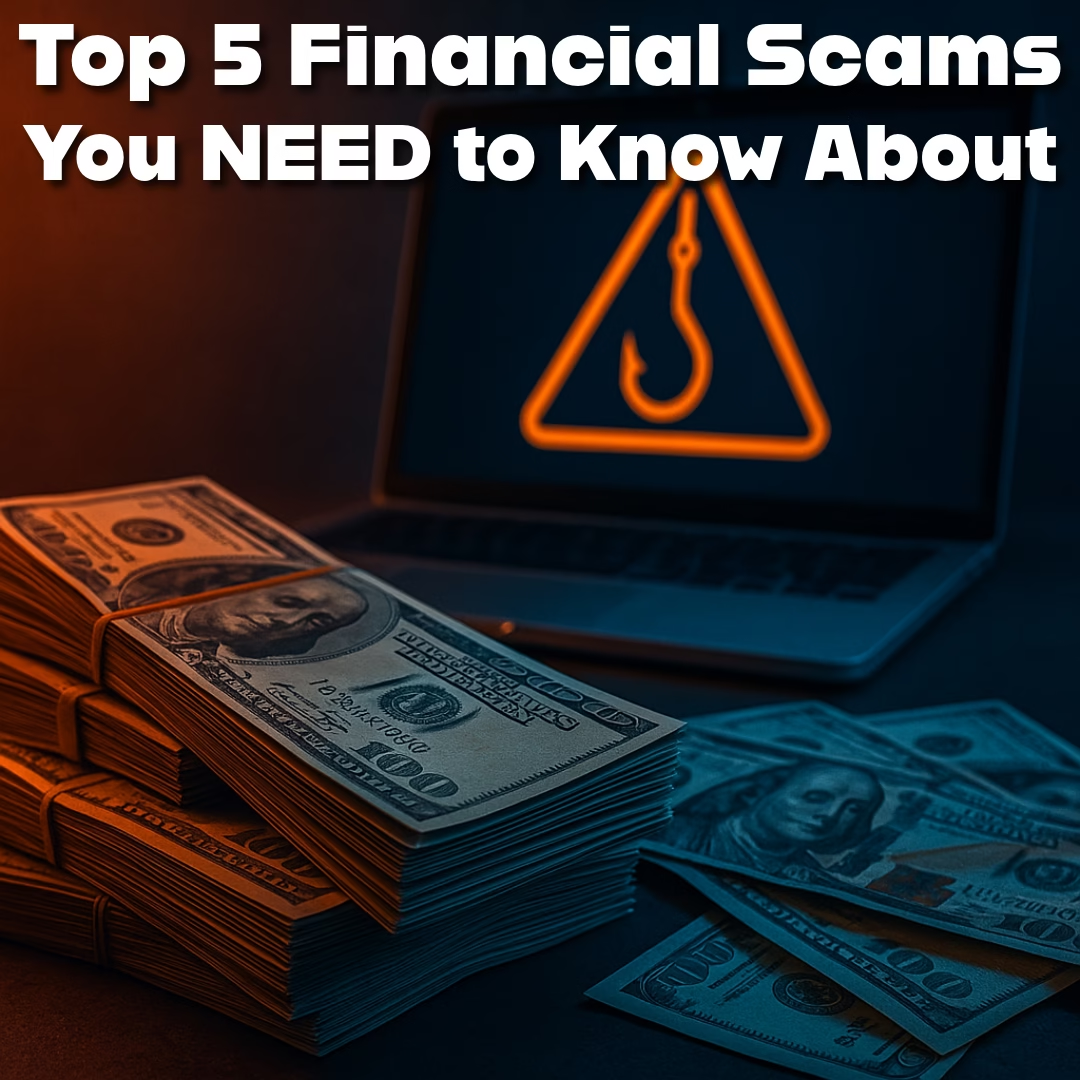Scams can be a disaster, especially financial scams – if you’re working hard to build savings, get out of debt, and move closer to financial freedom. These scams are everywhere, and the scammers are getting smarter every day. Whether you’re paying off credit cards, building your underconsumption core, or just trying to keep your budget simple, getting scammed can ruin everything you’ve worked for.
Here are the top 5 financial scams you need to know about — and easy tips to protect yourself.
1. Phishing Scams
What it is: Phishing is when scammers pretend to be your bank, a government agency, or a company like Amazon to trick you into giving up personal information like passwords, credit card numbers, or your Social Security number.
How to spot it:
- Emails or texts that say things like “Your account is locked” or “You’ve won a prize.”
- Links that look suspicious or send you to fake websites.
- Calls from people who demand payment right away using gift cards, wire transfers, or crypto.
How to avoid it:
- Don’t click on links in emails or texts unless you’re 100% sure they’re legit.
- Use multi-factor authentication (MFA) on all your accounts.
- Always type in website addresses yourself—don’t trust links from strangers.
More tips from the FTC on phishing
2. Investment Scams (Including Crypto Schemes)
What it is: These scams promise quick, high returns for low risk. Many pop up as “once-in-a-lifetime” crypto opportunities or “can’t-miss” stock picks on social media.
How to spot it:
- Promises of guaranteed returns or passive income with little effort.
- “Limited-time” deals or pressure to invest fast.
- No clear explanation of how the investment works.
How to avoid it:
- Stick to simple finance strategies like low-cost index funds (like VOO or VTI).
- If it sounds too good to be true, it probably is.
- Research with legit sources like the SEC’s Investor.gov.
3. Online Marketplace and Selling Scams
What it is: Scammers target buyers and sellers on sites like Craigslist, Facebook Marketplace, OfferUp, and even eBay.
How to spot it:
- Sellers ask for payment upfront but never deliver.
- Buyers “accidentally” send extra money and ask for a refund before the original payment clears.
- Offers that seem way too good to be real.
How to avoid it:
- Always meet in person in a safe location, like a police department parking lot.
- Only accept cash or secure app payments like PayPal Goods & Services.
- Don’t ship items until payment clears.
Facebook Marketplace safety tips
4. Romance and Relationship Scams
What it is: Romance scams happen when someone pretends to be interested in a relationship, gains your trust, and then asks for money—often for fake emergencies.
How to spot it:
- They quickly move the conversation off dating apps to text or email.
- They say they’re “overseas” or “traveling” and can’t meet.
- They ask for money or gift cards, often claiming it’s for a family emergency or travel.
How to avoid it:
- Never send money to someone you haven’t met in person.
- Be cautious of anyone who avoids video calls or meeting in real life.
- Report suspicious profiles to the app or website.
5. Fake Job Offers and Side Hustles
What it is: These scams pretend to be job offers, often remote or part-time, and are designed to steal your personal information or money.
How to spot it:
- Jobs that offer high pay for little work.
- You’re asked to pay for training, equipment, or “processing fees.”
- Emails from free domains (like Gmail) instead of a company address.
How to avoid it:
- Research the company on sites like Glassdoor or LinkedIn.
- Don’t give out your bank info or Social Security number until you verify the company.
- Be cautious of job offers that arrive out of nowhere.
Better Business Bureau job scam tracker
Final Thoughts
If you’re following the underconsumption core mindset — spending less, saving more, and avoiding debt — then you’re already taking steps toward financial freedom. But staying safe from scams is just as important. Scammers go after everyone, especially people who are trying to make smart money moves.
Here’s a simple finance checklist to stay protected:
- Trust your gut—if something feels off, walk away.
- Use strong passwords and turn on MFA.
- Check your credit regularly with AnnualCreditReport.com.
- Report scams to the FTC.
And remember, your journey to financial freedom is worth protecting. Stay smart, stay skeptical, and stay safe.
If you love finding ways to save money and want more tips on achieving financial independence, join our FREE mailing list! We share simple, actionable advice to help you live debt-free, save smarter, and enjoy life without financial stress. Sign up today and take the next step toward a better financial future!
